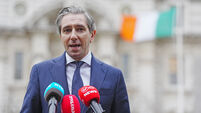'People felt really empowered by him to be ugly': The Irish in US prepare for Donald Trump

As he heads back to the White House on January 20, Americans — and the Irish among them — are considering Donald Trump's shocking political resurrection with a mixture of hope and fear. File photo: AP/Yuki Iwamura
Claire Foley-O’Connor was in a Florida drugstore queue recently when she overheard a conversation between a young woman with a baby in front of her and the sales assistant.
“The poor girl had the whooping cough and needed antibiotics. Her prescription bill came to $65. She only had $17. The technician started looking for another generic medicine for her and she started crying. I walked up to the counter and said 'I’m paying for it and anything else she needs',” said the Sligo native.













